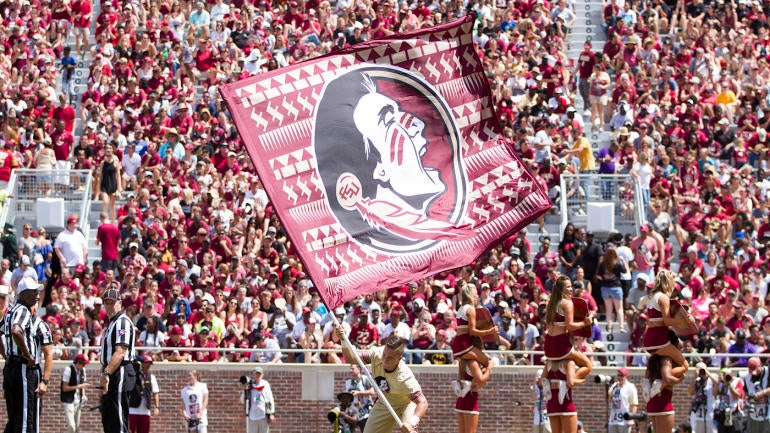
Florida State's Board of Trustees voted unanimously on Friday to file a lawsuit against the ACC challenging the league's grant of rights and withdrawal penalties, taking a critical first step towards a potential exit. The seven-count suit, filed formally in Tallahassee Circuit Court, alleges the ACC breached contract for failing to create appropriate media rights value and violated the state of Florida's antitrust laws. Moreover, it claims the penalty for withdrawal -- a mind-boggling $572 million, $130 million of which comes from TV revenue -- is unenforceable.
"We have exhausted all possible remedies within the conference, and we must do what's best for Florida State not only in the short term, but in the long term," said board chair Peter Collins during the one-hour meeting, which was made public due to the state's Sunshine Law.
The unprecedented move takes aim at the so-called "ironclad" grant of rights tethering members to the ACC through 2036; however, the media rights agreement with ESPN -- the conference's media partner -- runs through 2027 with a unilateral right to exercise a nine-year option through 2036. The suit alleges ESPN gave the ACC an "ultimatum" during the negotiation of the current deal in 2016 that there would be no further negations until the deal expires.
The ACC preemptively filed a lawsuit against against Florida State in Mecklenburg County, North Carolina, on Thursday claiming the school is prohibited from challenging the grant of rights deal.
Though Florida State's omission from the College Football Playoff field as an undefeated Power Five conference champion may have been the final straw, the university has previously acknowledged its desire to explore options outside of the ACC, primarily due to the growing revenue gap behind the SEC and Big Ten. The ACC has attempted to be aggressive in finding further compensation for its top members. In May, the league introduced "success incentives," allowing schools with postseason success to receive a larger piece of the distribution.
FSU also voted against adding SMU, California and Stanford next summer. FSU outside council David Ashburn said during the meeting that the three new members do not provide tier-one media value in football, and the rest of the conference will diminish the bargaining power for the ACC in future media rights negotiations.
"Ultimately, what we are fighting for here is not just for our own best interests at FSU," said board member and former Seminoles quarterback Drew Weatherford. "I think that we are fighting for true competitive spirit. All we are looking for is an equitable competitive environment where teams that are competing for a championship are waking up and playing by the same rules."
Challenges of leaving
The ACC has the longest television contract and grant of rights of any FBS conference, having signed a 20-year agreement with ESPN in 2016. At least seven ACC schools have looked at the procedures for breaking the grant of rights but have all ultimately opted to stay put after investigating the details.
Buying out the TV contract would cost roughly $130 million, and breaking free of the grant of rights is a separate negotiation pushing the total withdrawal fee north of half a billion. Even then, industry experts told CBS Sports' Dennis Dodd in May that it's unlikely that any ACC schools would be able to join one of the two big conferences without taking a partial share, making for a shaky benefit.
Also in August, Florida State contemplated turning to private equity to raise funds. The school was in contact with JPMorgan Chase and private equity firm Sixth Street to consider options. Florida State could essentially raise money up front to pay for a potential grant of rights buyout and compensate the private equity group with money from future television rights deals and sponsorships. The Pac-12 considered a similar plan in 2019 to raise capital, but it ultimately did not go through.
Where would FSU go?
The ideal landing spot would be the SEC. The league has established itself as the top dog in college football and the Seminoles fit neatly into the league footprint. However, there's plenty working against them. In-state rival Florida would almost certainly do anything in its power to block FSU from entering the league. For many SEC members, adding Florida State would be more of a threat than a benefit both in recruiting and on the field.
That leaves the Big Ten as a potential Hail Mary destination. The league does not have any schools closer to FSU than former ACC partner Maryland, but FSU could provide some benefit. While the Big Ten is stocked with historic brands, only two members of the future conference -- Ohio State and USC -- have won a national championship in the BCS/CFP era. The 'Noles, meanwhile, have two themselves (1999, 2013). Additionally, adding a southern power could open another door for the Big Ten to recruit in Florida, which ranks as one of the three top recruiting destinations in college football.
If the Big Ten is not interested, however, Florida State could find itself in a brutal position. Florida State athletic director Michael Alford told The Athletic in November that independence was "not a true option" because of the complications of media contracts and scheduling. The Big 12's media deal is comparable to the ACC's, making it an unlikely destination.
Landing in the power conferences is only getting more difficult. Oregon and Washington took approximately 50% shares to leave the Pac-12 for the Big Ten through the end of the media rights deal. SMU is notably not taking television payout for seven years to join the ACC. Florida State might have to take a similar short term haircut to make its case to another league.





















